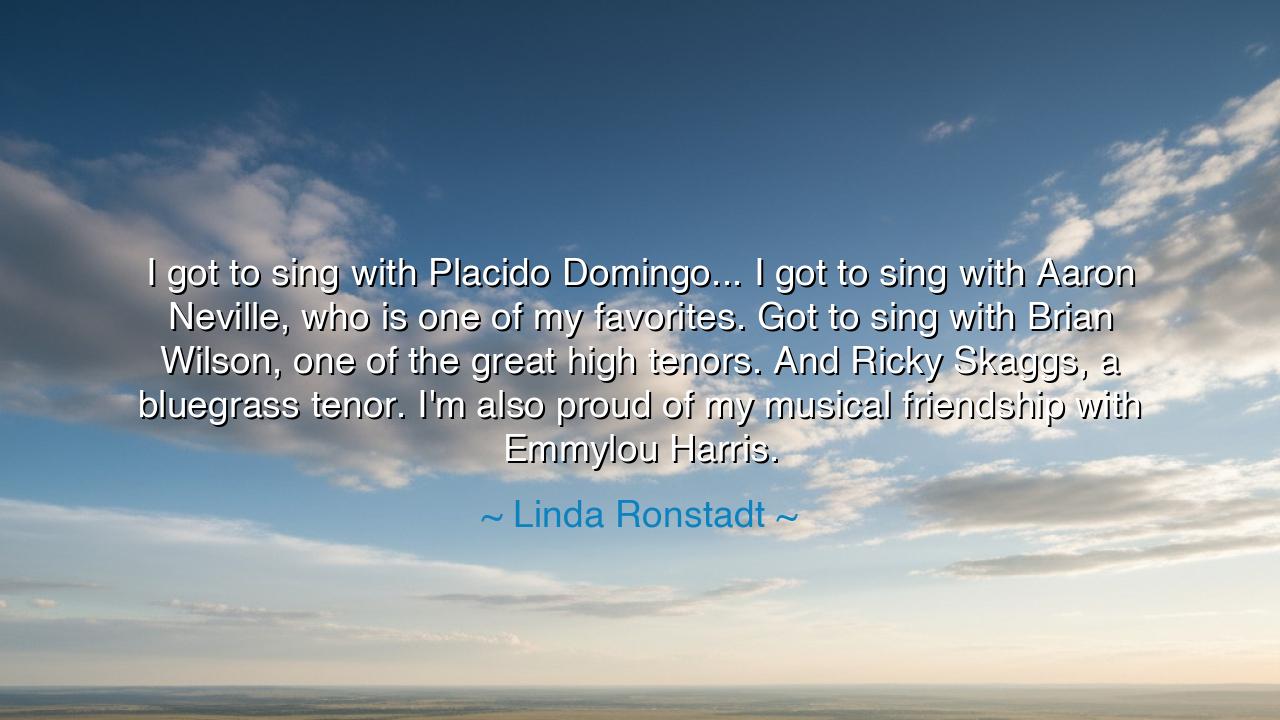
I got to sing with Placido Domingo... I got to sing with Aaron
I got to sing with Placido Domingo... I got to sing with Aaron Neville, who is one of my favorites. Got to sing with Brian Wilson, one of the great high tenors. And Ricky Skaggs, a bluegrass tenor. I'm also proud of my musical friendship with Emmylou Harris.






"I got to sing with Plácido Domingo... I got to sing with Aaron Neville, who is one of my favorites. Got to sing with Brian Wilson, one of the great high tenors. And Ricky Skaggs, a bluegrass tenor. I'm also proud of my musical friendship with Emmylou Harris." Thus spoke Linda Ronstadt, a woman whose voice was not merely a sound, but a soul set free in melody. In her words, there is more than pride — there is gratitude, reverence, and a deep understanding of what it means to share one’s art with others. This is not the boast of a performer, but the confession of an artist who has discovered the sacred power of collaboration, the eternal truth that music — like life — becomes divine when voices join in harmony.
From the dawn of time, song has been the language of communion. The ancients sang to the gods not in solitude, but together — tribes, families, and nations uniting in chorus. It was understood that no single voice, however beautiful, could contain the full mystery of existence. The chorus was a symbol of unity: many hearts beating as one, many souls breathing through a single sound. So when Linda Ronstadt speaks of singing with the greats — Domingo, Neville, Wilson, Skaggs, and Harris — she is invoking this ancient truth: that art, like friendship, grows richer when shared.
To sing beside Plácido Domingo, the titan of opera, is to touch the grandeur of the classical soul — the disciplined flame of the eternal stage. To sing with Aaron Neville, whose trembling tone carries the ache of love and the pain of loss, is to touch the fragile beauty of human feeling. Brian Wilson, the dreamer of the sea and the sky, lends his voice from the world of pop’s poetic innocence; Ricky Skaggs, rooted in the mountains, brings the wild cry of the earth itself. And with Emmylou Harris, her friend and kindred spirit, Linda shares not just harmony, but memory — a bond between equals who have weathered time and melody together.
Each of these companions reflects a different color of music’s soul, and in embracing them, Ronstadt embraced the universality of art. In her collaborations, one sees the humility of the true artist — the wisdom to know that greatness is not born of isolation but of communion. She reminds us that a song is not a conquest but a conversation; it is not a throne to sit upon, but a bridge to cross together. In this, she echoes the wisdom of the ancients — that the noblest soul seeks not dominion, but harmony.
So too did the poet Li Bai of ancient China wander the land, drinking wine and writing verses with his companions. One night, beneath the moon, he said to his friend Du Fu, “Let us lift our cups and let our shadows dance.” Their poetry, like Ronstadt’s songs, lives on not because of one voice, but because of the bond that joined them. They understood what every great creator learns in time: that the truest art is born when spirits meet in mutual reverence — when pride yields to wonder.
Yet such union is not without its discipline. To harmonize with another requires surrender — the softening of ego, the listening heart, the patience to yield when the song demands it. It is, in truth, a spiritual exercise. The mighty must learn gentleness; the gifted must learn humility. In this surrender, beauty is born — the kind that transcends individuality and becomes eternal. So Ronstadt’s “musical friendships” are not mere duets, but pilgrimages — journeys of trust, respect, and shared devotion to something greater than themselves.
In this light, Linda Ronstadt’s words are not just a recollection of her career, but a testament to the sacredness of collaboration. Each name she speaks is a stone in the temple of her artistry, each voice a mirror reflecting her own. And thus we learn: it is not enough to sing beautifully — one must sing with others beautifully. For in the joining of voices, the soul discovers its highest truth: that no melody is complete until it has found its harmony.
Lesson: True greatness does not stand alone. It walks beside others, listens deeply, and gives of itself without fear. Collaboration is not weakness but wisdom — it is the art of weaving one’s voice into the grand tapestry of creation.
Practical action: Seek out those whose spirits challenge and inspire your own. Work, create, and dream with them. Whether in music, in craft, or in life itself, learn to blend your strengths with the gifts of others. When your song becomes a harmony, when your heart learns both to lead and to listen, you will know what it means to live artfully — and your life will sing, long after the final note has faded.






AAdministratorAdministrator
Welcome, honored guests. Please leave a comment, we will respond soon